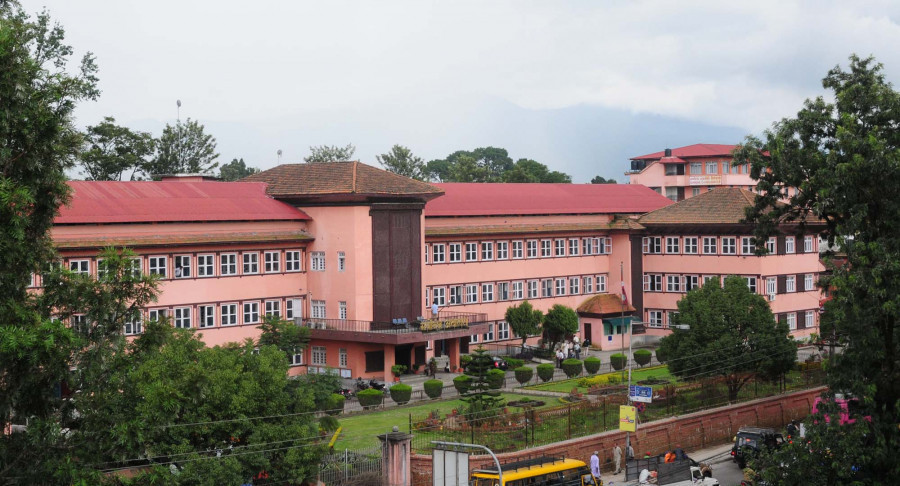National
Constitutional Bench still unsure which bench will hear House dissolution case
While government wants Constitutional Bench to hear the case, petitioners say full bench must look into it.
Binod Ghimire
The Constitutional Bench of the Supreme Court hasn’t yet decided whether to send cases involving writ petitions filed against the dissolution of the House of Representatives to the extended full bench or to continue to conduct hearings itself.
Lawyers representing the petitioners have demanded that the extended full bench of the Supreme Court look into the case, instead of the Constitutional Bench, as the court—not the bench—is the final interpreter of the constitution. But the defendants are saying that the matter should be decided by the Constitutional Bench as it involves issues related to the constitution.
“The Constitutional Bench has limited jurisdiction. Cases like the ones involving the dissolution of the House of Representatives need to be decided by a bench with wider jurisdiction,” said senior advocate Hari Uprety, one of the lawyers representing the petitioners. “It wasn’t necessary to send these writ petitions to the Constitutional Bench.”
As per Article 128 (1) of the constitution, the Supreme Court has the final power to interpret the constitution and the country’s laws. Article 137 (1), says that the Constitutional Bench shall hear and decide cases related to disputes over the jurisdiction between the federation and a province, between provinces, and between a province and a local level. Similarly, Article 137 (3) authorises the chief justice to allocate the cases under consideration at the Supreme Court containing questions of serious constitutional explanation to the Constitutional Bench.
“Hearing on the constitutionality of the dissolution of the House of Representatives will begin once the bench is finalised,” Kishor Poudel, communication expert at the Supreme Court, told the Post. “While the petitioners are demanding an extended full bench, the defendants want the Constitutional Bench to decide the matter.”
The bench, meanwhile, has decided to continue the hearing on Friday as well after lawyers representing the defendants couldn’t finish presenting their arguments during Wednesday’s hearing. Lawyers representing the petitioners have finished presenting their arguments.
As many as 12 lawyers, who have challenged the dissolution of the House of Representatives, are demanding that an extended full bench comprising 11 justices hear the case. The five-member constitutional bench is too small to decide an important case such as the dissolution of the House, they argue.
During Wednesday’s hearing, senior advocate Shambhu Thapa said that there was no alternative to forming an extended full bench to decide the case as this approach had been adopted in the past as well when the dissolution of the House was challenged in court.
In response to Thapa, Chief Justice Rana questioned, “Don’t these writs require that the court explain the articles of the constitution? If you agree that this is a serious constitutional issue, doesn’t it come under the jurisdiction of the Constitutional Bench?”
It was Rana whose single bench on December 23 decided to send 12 writ petitions filed against the dissolution of the House of Representatives to the Constitutional Bench. Two days later. Rana constituted a five-member Constitutional Bench led by himself to look into the case.
His decision to form the Constitutional Bench leaving out the senior-most justices was dragged into a controversy. When the hearing began on January 6, the plaintiffs and lawyers advocating on behalf of the petitioners flagged two issues: the presence of justice Hari Krishna Karki on the bench and the practice of sending writs related to the dissolution of the House of Representatives to the extended full bench.
The lawyers argued that since Karki had served in the capacity of the attorney general (the government’s chief legal advisor) to the Oli government back in 2015, his presence on the bench constituted a conflict of interest as the bench was hearing petitions against Oli.
Karki had then decided to recuse himself from the bench and was replaced by Justice Sapana Pradhan Malla on Wednesday.
Meanwhile, senior advocate Raman Shrestha responded to Rana saying that along with the interpretation of the constitution, the Supreme Court had to decide whether the case is political in nature as claimed by Prime Minister KP Sharma Oli. “The Constitutional Bench doesn’t have the authority to do so," he said.
In its written response to the Supreme Court, the Prime Minister’s Office has claimed the dissolution of the House of Representatives is a political issue and doesn’t require a judicial review. Oli had made the same argument when he defended his decision to announce snap elections, at the National Assembly on Sunday.
Another argument the defendants have presented is that cases related to the dissolution of Parliament were heard by the full bench in the past as the then-constitution didn’t have provisions for a constitutional bench. But the new constitution has provisions for a bench to hear cases that require interpretation of the constitution.




 13.12°C Kathmandu
13.12°C Kathmandu














